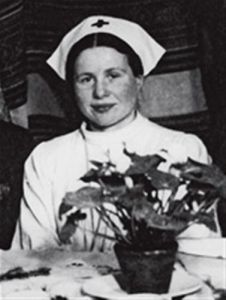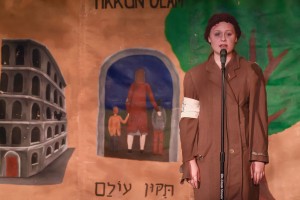About the Project
THE DISCOVERY
Students from rural Kansas discovered a Polish Catholic woman who saved Jewish children. Few had heard of Irena Sendler in 1999. Now, after 375 presentations of Life in a Jar, a website with tremendous usage and worldwide media attention, a motion picture and the award-winning book “Life in a Jar: the Irena Sendler Project,” Irena is known to the world.
How did this beautiful story develop? Read on for the answers. In the fall of 1999, a rural Kansas teacher encouraged three students to work on a year-long National History Day project which would, among other things, extend the boundaries of the classroom, contribute to history learning, teach respect and tolerance, and meet their classroom motto, “He who changes one person, changes the world entire.”
Two ninth graders, Megan Stewart and Elizabeth Cambers, and an eleventh grader, Sabrina Coons, accepted the challenge and decided to enter their project in the National History Day program (Eventually, a number of other students were added to the project). Their teacher, Mr. Norm Conard, showed them a short clipping from a March 1994 issue of News and World Report, which said, “Irena Sendler saved many children and adults from the Warsaw Ghetto in 1942.” Her network saved children from the Ghetto plus provided hiding locations for over 2,000 children. Norm told the girls the article might be a typographical error since he had not heard of this woman or story. The students began their research and looked for primary and secondary sources throughout the year.
IRENA’S LIFE
(See much more about Irena on the Sendler Family page and the Facts about Irena page.)
They found that Irena Sendler, as a non-Jewish social worker, had gone into the Warsaw Ghetto with her network and talked Jewish parents and grandparents out of their children, rightly saying that all were going to die in the Ghetto or death camps, taking the children past the Nazi guards or using one of the many means of escape from the Ghetto-the old courthouse for example- and then adopting them into the homes of Polish families or hiding them in convents and orphanages. She and her network of 25 people made lists of the children’s real names and put the lists in jars, then buried the jars in a garden so that someday she could dig up the jars and find the children to tell them of their real identity. The Nazis captured her, and she was beaten severely, but the Polish underground bribed a guard at Pawiak Prison to release her, and she entered into hiding.
Irena and her network had made false documents for people in the Warsaw area from 1939 to 1942, helping save so many children, adults, and families, BEFORE she joined the underground Zegota in December of 1942. In fact, Irena’s life has been one of standing up for others. Her father was an inspiration for serving the world. Irena wants us to mention that 25 others were under her guidance in saving children from the Ghetto, and a number of others were helping outside the Ghetto.
FROM KANSAS TO THE WORLD
The students wrote a performance (Life in a Jar) in which they portrayed the life of Irena Sendler. They have performed this program for numerous clubs and civic groups in the community, around Kansas, and all over North America and Europe (over 380 presentations as of May 2019). Their small community had little diversity and no Jewish students in the school district. The community was inspired by the project and sponsored an Irena Sendler Day. The students began to search for Irena’s final resting place and discovered she was still alive and living in Warsaw, Poland. Irena’s story was unknown worldwide, even though she had received esteemed recognition from Yad Vashem in 1965 and support from the Jewish Foundation for the Righteous in New York City. Forty-five years of communism had buried her story, even in her own country.
From that time on, they would take a jar to every performance and collect funds for Irena and other Polish rescuers. (They call their performance Life in a Jar.) The significance of this project really started to grow with many numerous contacts. These contacts assisted the students in sending the funds to Poland for the care of Irena and of other rescuers. They wrote Irena, and she wrote dozens of deeply meaningful letters to them, with such comments as, “My emotion is being shadowed by the fact that my co-workers have all passed on, and these honors fall to me. I can’t find words to thank you for my own country and the world to know of the bravery of rescuers. Before the day you wrote Life in a Jar, the world did not know our story; your performance and work are continuing the effort I started over fifty years ago. You are my dearly beloved ones.”
They discovered a Polish student who began to translate for them. They made a collection of the letters and have shared these documents with universities, historical societies, and the Chicago and New York City Jewish Foundations for the Righteous. Their cause for Irena Sendler became a national cause; they had rediscovered this courageous woman. The students appeared on C-SPAN, National Public Radio, CBS, CNN, the Today Show, in numerous newspaper articles, including the Chicago Tribune, Los Angeles Times and New York Times, and magazine articles, such as Ladies Home Journal and Guidepost. They were invited to perform in Washington, D.C. and before a Jewish foundation in New York City. They have become knowledgeable on subjects such as the Holocaust, World War II, and the Polish Underground. More than twenty colleges and universities have been using their letters from Irena and their project information in their curriculum.

Apple Tree Where Lists Were Buried
Great emotion pours out of the audience during their presentation. They have literally taken their class motto and brought it to life. They regularly wrote on their homework papers such notes as, “I’m changing the world” and “Irena’s story must be told.” Several of the students experienced great emotional situations in life, as had later members of the project. Megan’s (Megan portrays Irena) mother was forty and was seriously ill with cancer; she passed away in June of 2006. Sabrina’s mother also passed on during the years of the project.
The three original students continued to dream of visiting Warsaw, interviewing Irena, surviving children, and others connected to this story. In January 2001, they performed before a large school district in a city about 100 miles from their school. A Jewish educator and businessman saw the performance and asked to have lunch with them that day. He told them he would raise the money and send them to Warsaw if they would go that spring (Irena was 91 and in poor health) and bring back her story. The man raised the money in twenty-four hours.
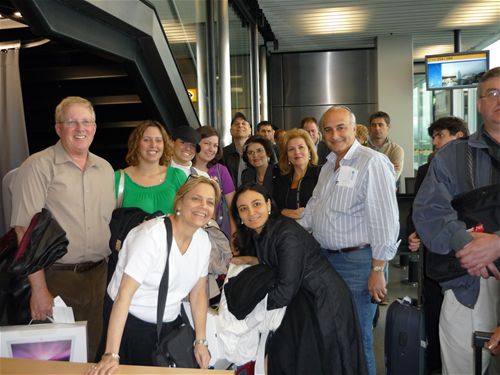
Poland Trip
On May 22, 2001, Mr. Conard traveled to Warsaw, Poland, with four students and several parents (Bill and Phyllis Cambers, Debra Stewart, and a local patron). They spent time with Irena Sendler and then extended the boundaries of the classroom to the world. The Polish organization for the Children of the Holocaust arranged a meeting between the rescuers and the children saved; this was the first such meeting in many years. They also met a famous Polish poet who was saved by Irena and an author of a well-known memoir of the Holocaust who called the students rescuers of the rescuer; The Polish press made this story international news. Irena’s story was finally reaching others. The students were called “rescuer’s, rescuers of Irena’s story” by one of the children Irena saved.
The group met Elzbieta Ficowska and heard her beautiful story of being rescued by Irena at the age of 5 months, carried out in a carpenter’s box. A great circle of Polish friends have aided the project in many ways.
In 2002, the founders of the project and new students traveled to Poland. They interviewed people connected to Irena and her story, plus visited with Irena on several occasions. They also visited Treblinka and retraced Irena’s steps in the Warsaw Ghetto. The story of Irena Sendler continues to expand, continues to inspire.
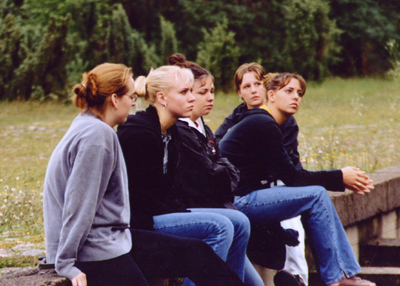
Students at Treblinka
With this project, the students (twelve are now working on this project, and over 50 students have over the years), including Addi Brown, Mary Fischer, Noah Fischer, and Mary Kerr, are extending the classroom into the world community in many ways, such as publishing the interviews, performing before larger audiences, sharing letters from Irena with students and educators, (copies have been requested and sent to over 1,000 schools) and interviewing with local and national press. This project has created ongoing interactive communication with families in our community and communities across the country. The original students are now in their 30s, and the three original founders are married with children. They continue to present Life in a Jar. All of the present students are in college or have graduated. Megan Stewart Felt is the Program Director of the Lowell Milken Center for Unsung Heroes, Liz Cambers Hutton is a history teacher at Lebanon, MO high school, and Sabrina Coons Murphy is teaching in an elementary school in Girard, Kansas.
Many parents and community members are involved in the project. A lady in the community has organized an Irena Sendler Day, and another has organized an Irena Sendler Week. The students continue to perform in front of local churches, civic groups and clubs. Life in a Jar has been presented in a number of states and on two summer tours. In November 2004 and February 2007, the Milken Family Foundation sponsored Life in a Jar in a series of presentations in Los Angeles. Also, a teacher’s/classroom study guide has been produced.
The Jewish community in Kansas City has reached out in a powerful way to involve itself with the project. The community as a whole has adopted the project and this courageous woman as a part of the family. The Jacobsons, Krigels and Isenbergs are families who have assisted the students in so many ways. Howard and Ro Jacobson established a scholarship fund for Uniontown students who needed help with college.
The story of Irena Sendler continues to spread. Over 3,500 media outlets have presented articles about the Kansas kids and the Polish heroine. As a child survivor, Renata Zajdman, a close friend of the project, says, “The young men and women of Kansas put Irena’s story on the map.”
In 2005, the group again traveled to Poland for presentations of Life in a Jar. You may view the news section of this website for information on that trip. An international Irena Sendler Award was started in 2006. Irena was also nominated for the Nobel Peace Prize in 2007. Schools have been named after her and a book in Polish and German has been printed.
In 2009 the Hallmark Hall of Fame produced The Courageous Heart of Irena Sendler for CBS. The world premiere was held in Fort Scott, Kansas, with many of the students from the cast and project present. Also present was Renata Zajdman (saved by Irena’s network at age 14), actors and directors of the movie, the Hall family from Hallmark, and many others who have supported the story.
The irenasendler.org website has had over 55 million hits.
EPILOGUE
Irena passed away on May 12, 2008. She was buried in a Warsaw, Poland cemetery. Her family and many of the rescued children continue to tell her story of courage and valor. The Life in a Jar students continue to share her legacy through the play, this website, through schools and study guides, and world media. The Life in a Jar: Irena Sendler Project book by Jack Mayer has been one of the top Holocaust books on Amazon for over 17 years. Recently, Mr. Conard and Liz Cambers Hutton, led a tour of 32 people to Poland to visit Irena sites. The Lowell Milken Center has an exceptional Irena Sendler exhibit, in Fort Scott, Kansas which is viewed by thousands of people.
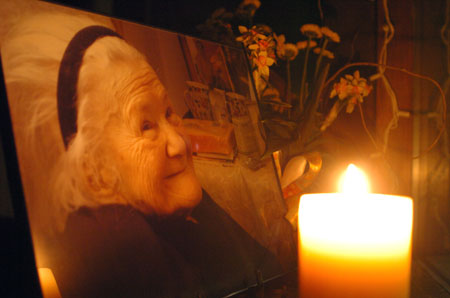
Remembering Irena

